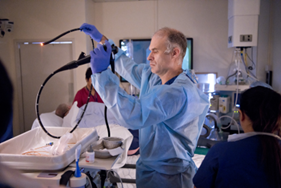Colonoscopy is one of the main investigations to detect and prevent bowel cancer.
Colonoscopy services in the UK are experiencing growing pressures. In response, endoscopy units have been extending opening hours and offering weekend procedures; this not sustainable, especially in the wake of Covid-19 which is intensifying the pressures on clinical services. In a resource-constrained environment, the endoscopy profession has to find new ways to improve efficiency and quality.
The WAVE study is one of St Mark’s responses to this need. For the first time, a controlled trial will compare two colonoscopy techniques (water and water & carbon dioxide [hybrid]) to identify which should be used to open up the bowel wall to see the lining of the bowel.
Understanding which technique is better at reducing pain, the procedure time and need to reposition patients, as well as being the most effective at improving the detection of pre-cancerous and cancerous growths, would help the colonoscopy procedure to be performed more efficiently with potentially better tolerance and outcomes for patients.
